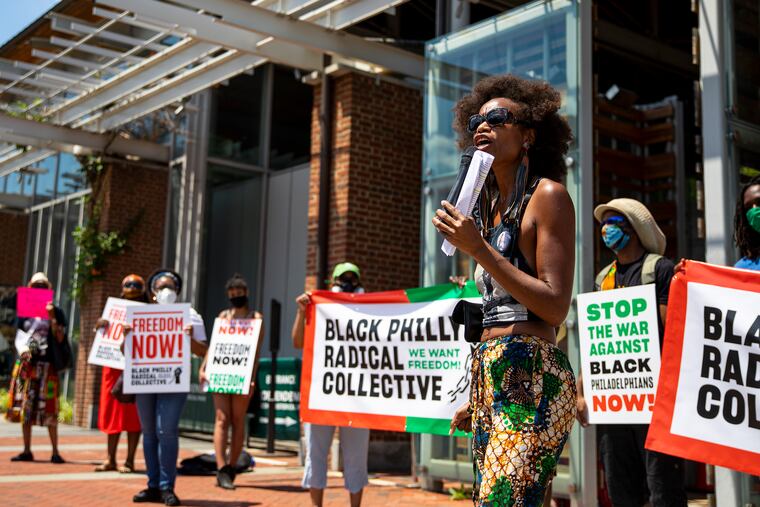Black groups demand Philly end tear gas use, put police funding toward school repair
The city’s temporary action and apology ring hollow, said members of 10 Philly Black organizations gathered near Independence Hall Friday.

A collective of local Black organizations is demanding that Philadelphia permanently end the Police Department’s use of gas, grenades, assault rifles, and surveillance of protests and neighborhoods — one day after Mayor Jim Kenney and Police Commissioner Danielle Outlaw issued an apology for letting officers use tear gas, pepper spray, and rubber bullets on protesters gathered on I-676.
After weeks of defending police actions during the June 1 protest on the Vine Street Expressway, Outlaw said Thursday that the department was placing a moratorium on the use of tear gas to disperse crowds.
But the city’s temporary action and apology ring hollow, said members of 10 Black organizations gathered near Independence Hall on Friday. They noted that protesters were arrested again this week and that the city has remained largely silent on the use of tear gas in a predominantly Black neighborhood in West Philadelphia.
The group announced a list of 13 demands for the city, which included ending the Police Department’s use of military weapons and protest surveillance; reducing its already-flat-funded police budget by 20% and directing the money toward the removal of lead and asbestos from Philadelphia’s schools; and launching independent investigations into mostly white violent mobs in South Philadelphia and police use of force against protesters.
They also demanded the city remove a sign in Overbrook Farms dedicating a portion of 59th Street to former Mayor W. Wilson Goode Sr., who in 1985 authorized police to bomb a house on Osage Avenue, killing 11 MOVE members — including five children — and burning two city blocks.
» READ MORE: Renaming a Philadelphia street after former Mayor Wilson Goode is a really bad idea | Jenice Armstrong
The city’s “apology is not for me, that apology is for the white faces that came down to protest,” said activist Kamau Mshale, noting the lack of attention paid to the police use of tear gas in West Philadelphia on May 31 compared with on I-676 the following day.
» READ MORE: This West Philly neighborhood had been struggling to rebuild. Then the looting started.
“It’s evident in how the police responded on 52nd Street vs. how they responded anywhere else in the city that it’s racist, it’s intentionally racist,” Mshale added. “We do not accept it. We want to see actual action.”
As outcry from protesters pushing to defund — and in some cases abolish — police departments has swept the nation in the wake of George Floyd’s death, Philadelphia officials have made changes to the city’s police budget and structure by canceling a $19 million budget increase, moving crossing guards and public safety officers out of the department, and introducing a broad set of goals for reforming the force.
» READ MORE: Philly budget deal cancels $19 million increase in police funding, moves another $14 million elsewhere
» READ MORE: After days of protests against police brutality, Mayor Jim Kenney pledges police reforms
And on Thursday, addressing police response to violent mobs, District Attorney Larry Krasner told reporters that “many investigations” are ongoing.
But “radical change,” not just reform, is needed, collective leaders said.
“The recent police reform plan has not led to an authentic defunding of the Philadelphia Police Department,” said Megan Malachi of Philly for REAL Justice. “The decision to move crossing guards to a different agency does not constitute a new investment in community-controlled public safety. It simply provides elected leaders with a convenient cover for their unwillingness to commit to radical change.”
The group also called for disbanding all city private police departments, such as SEPTA transit and university police; abolishing the Fraternal Order of Police union; and gradually defunding the Police Department over the next five years. Organizers of the collective said they intend to continue to hold demonstrations throughout the city.
“We are working for the liberation of all our people,” said YahNé Ndgo of Black Lives Matter Philly. “And the truth is that when you liberate all Black people, you liberate all people.”